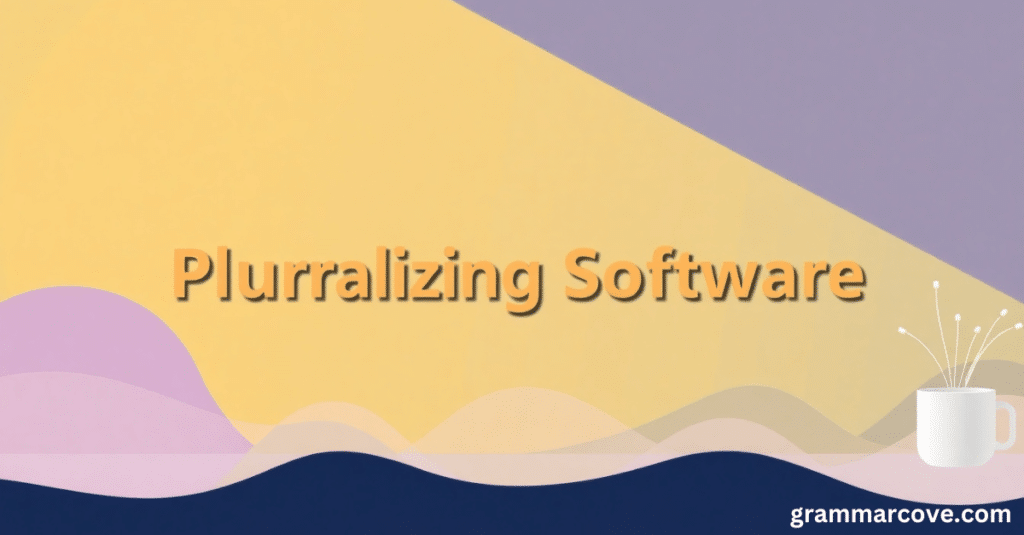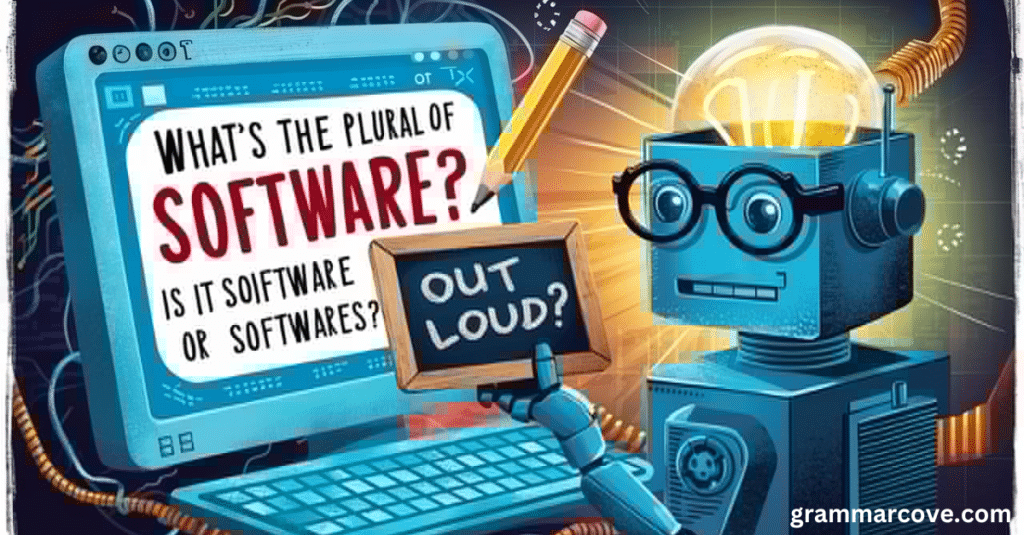The English language often throws curveballs when it comes to grammar and word usage. One such question that frequently confuses both native and non-native speakers alike is: What’s the plural of software? Is it software or softwares?
At first glance, it may seem simple enough. After all, we are accustomed to adding an “s” or “es” to the end of words to indicate the plural. But software isn’t a typical noun—it’s a mass noun, also known as an uncountable noun. So, when it comes to the correct plural of software, the rules don’t always follow traditional patterns. Let’s dive into this linguistic puzzle and clear up the confusion once and for all!
What Is a Mass Noun?
Before we explore whether it’s “software” or “softwares,” let’s take a quick look at mass nouns (also called uncountable nouns). Mass nouns are words that represent items that we cannot count individually or that refer to a concept or collection as a whole. Examples include water, air, furniture, and information.
Unlike countable nouns (like books or apple), mass nouns don’t have a plural form. So, the question becomes, “Does software fall into this category?” And if it does, that would mean we don’t need to add an s to the end when talking about more than one piece of software.
Let’s break it down:
Mass Noun Characteristics
- Cannot be counted individually: You wouldn’t say “two softwares” or “three waters.” Instead, you’d refer to “pieces of software” or “bottles of water.”
- Do not have a plural form: The word software stays the same whether you’re referring to one program or a multitude of programs.
- Used to represent a collective or abstract idea: It refers to a whole group or concept, rather than specific individual items.
Why “Softwares” Is Incorrect
Now that we have a solid understanding of mass nouns, let’s address the elephant in the room: Is “softwares” correct? Simply put, no, “softwares” is not considered grammatically correct in formal English.
Here’s why:
- Software is a mass noun: As explained earlier, the plural of a mass noun does not require an “s” at the end. This means the term software remains unchanged, regardless of whether you’re discussing one program or multiple programs.
- Contextual clarity: When you’re referring to more than one software product, the phrase “software programs” or “multiple software solutions” is often used. For instance, you might say, “Our company has developed several software tools and solutions to address different business needs,” rather than “softwares.”
However, you might still hear softwares used informally or in certain contexts, especially when someone is trying to distinguish between various types of software. But, in general, software remains singular, even when it refers to many different programs or applications.
Examples of Software Usage
Let’s go through a few real-life scenarios where software stays in its singular form:
- Email Example
To: John@company.com
Subject: New Software Update
“Hi John,
We just released an important update for the software. Please ensure all employees install it before the end of the week. Let me know if you encounter any issues.”
In this case, “software” refers to the entire program, even though it might include multiple components or versions. - Client Email Example
To: Lisa@creativeagency.com
Subject: Software Solutions Proposal
“Dear Lisa,
Thank you for your interest in our software solutions. We believe our software programs can greatly enhance your team’s productivity. I’ll follow up with a demo link shortly.”
Here, although you’re talking about various products or services, you still use the singular software in reference to the collective category of tools offered.
In these examples, you can see that while multiple products may be involved, we still refer to them collectively as software—never softwares.

Pluralizing Software: Alternatives
To avoid the awkwardness of using “softwares,” consider these alternatives to clarify when referring to more than one piece of software:
- Software programs: This phrase is common when discussing different types or individual applications.
- Multiple software solutions: Another way to express the idea of more than one software package or product.
- Different software tools: This is often used when talking about various tools that fall under the umbrella of software but serve distinct functions.
For instance, you might say, “We have several software tools and solutions for streamlining project management,” or “Our team uses multiple software programs to monitor system performance.”
These alternatives help maintain clarity while keeping the language grammatically correct.
Singular and Plural Nouns Like Software
The confusion about software can be better understood when we consider other uncountable nouns examples that behave similarly. Here are some nouns similar to software:
- Information: You don’t say “informations”; it’s just information, whether referring to one piece or many.
- Data: This term stays the same even when you’re talking about multiple sets of data.
- Advice: You wouldn’t say “advices.” Instead, you would say, “He gave me great advice.”
- Music: Even though music can refer to many songs, albums, or genres, it’s still considered music, not “musics.”
Just as with software, these words are mass nouns, so they don’t follow the regular pluralization rules.
Nouns Like Software: Understanding Mass Nouns
Mass nouns, like software, represent a group or category rather than individual, countable items. They are often abstract or collective in nature. As we’ve already mentioned, you wouldn’t use “softwares” because we’re not counting individual pieces in a traditional sense. Instead, we’re talking about the concept of software or the collection of software tools.
If you’re unsure about the plural form of other mass nouns, remember this simple trick: if you can’t count it directly (like water or furniture), it’s probably a mass noun, and the plural form doesn’t exist.
Origins and History of the Word “Software”
Understanding the history of the term “software” can provide additional context. The word software was coined in the early 20th century, around the 1950s, to differentiate between the physical hardware of computers and the intangible, functional programs that make the hardware operate.
Interestingly, software terminology wasn’t immediately standardized. The distinction between hardware (the physical machines) and software (the digital instructions or programs) became more important as computers evolved.
Modern Use of Software Language
The modern use of software language has further solidified the idea that software is a collective noun. From software tools to software programs and software solutions, the term is now deeply ingrained in the lexicon of technology, business, and everyday life.
People regularly use the term in contexts such as:
- “We’re upgrading our software tools to improve productivity.”
- “Have you tried the new software solutions for managing teams?”
Even in these instances, the word remains in its singular form because it refers to a concept rather than individual items.
Why “Softwares” Doesn’t Work
You might wonder, “Why is softwares incorrect if I’m talking about different types of programs?” Here’s the reasoning:
- The term software encompasses a wide range of programs and tools in a general, abstract sense.
- Adding an s at the end is unnecessary because it implies you are trying to count distinct units, but software represents a collective whole, not countable entities.
- Moreover, phrases like “different software programs” or “multiple software solutions” convey exactly what you’re trying to express without using the non-standard “softwares.”
Clarity in Referring to Software
To wrap up, software remains a mass noun, meaning it doesn’t change in the plural form. Whether you’re dealing with one application or dozens of programs, the term stays consistent.
Here’s a recap:
- Software is always singular, regardless of how many programs you refer to.
- If you need to emphasize more than one program or type, use descriptive phrases like “software tools” or “software programs.”
- Avoid using “softwares,” as it’s grammatically incorrect in formal contexts.
Final Thoughts
In conclusion, the plural of software is simply software—no “s” needed. By understanding the nature of mass nouns and their characteristics, you can navigate this tricky area of grammar with ease. Whether you’re discussing software solutions, different software programs, or multiple software tools, just remember that software stays the same in both singular and plural contexts.


